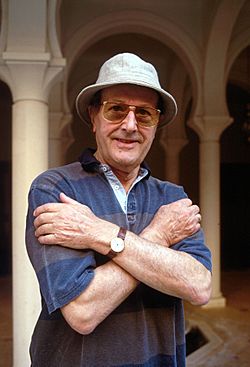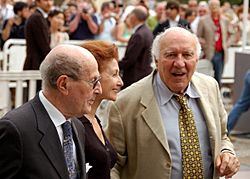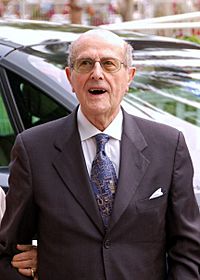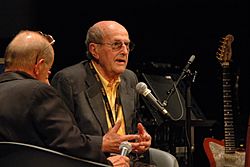Manoel de Oliveira facts for kids
Quick facts for kids
Manoel de Oliveira
|
|
|---|---|
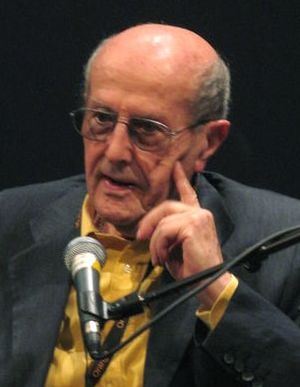
Manoel de Oliveira in 2011
|
|
| Born |
Manoel Cândido Pinto de Oliveira
11 December 1908 |
| Died | 2 April 2015 (aged 106) |
| Nationality | Portuguese |
| Occupation |
|
| Years active | 1927–2015 |
|
Notable work
|
|
| Spouse(s) |
Maria Carvalhais (m. 1940)
|
| Children | 4, including Manuel Casimiro |
| Relatives | Ricardo Trêpa (grandson) |
| Awards | Legion of Honour Golden Lion (2004, career) Palm d'Or (2008, honorary) |
Manoel Cândido Pinto de Oliveira (born December 11, 1908 – died April 2, 2015) was a famous Portuguese film director and writer. He was born in Porto, Portugal. He started making films in 1927 with his friends.
His first finished film was Douro, Faina Fluvial in 1931. It was a documentary about his hometown, Porto. In 1942, he made his first full-length movie, Aniki-Bóbó. For the next 30 years, he mostly made short films and documentaries.
In the 1970s, Oliveira became well-known around the world. He started making more ambitious films. He won many awards for his work. He was one of the most active film directors, even past the age of 100. He often made one film each year. In 2008, he was known as the oldest active film director in the world.
Some of his many awards include:
- The Career Golden Lion from the 61st Venice International Film Festival.
- An Honorary Golden Palm for his life's work at the 2008 Cannes Film Festival.
- The French Legion of Honor.
Contents
Early Life and Learning
Oliveira was born on December 11, 1908, in Porto, Portugal. His parents were Francisco José de Oliveira and Cândida Ferreira Pinto. His family was wealthy and owned factories and farmland. His father owned a factory and made the first electric light bulbs in Portugal.
Manoel went to school in Porto and then to a boarding school in Galicia, Spain. As a teenager, he wanted to be an actor. At 17, he started working in his father's factories. He spent most of his adult life working in business. He made films when he had the chance.
From a young age, Oliveira was interested in art and films. He was also interested in the lives of poorer people. He admired early filmmakers like D. W. Griffith and Charlie Chaplin. He wished there were more Portuguese filmmakers to learn from.
Filmmaking Journey
First Films and Features (1927–1942)
Oliveira first tried to make a film in 1927. He and his friends wanted to make a movie about Portugal's part in World War I. But the film was never finished. At age 20, he took acting classes. He even appeared as an extra in a film called Fátima Milagrosa. In 1933, he acted in the second Portuguese sound film, A Canção de Lisboa.
Oliveira became interested in directing after seeing Berlin: Symphony of a City. This was a documentary that showed the daily life of a city. He said it taught him a lot about film.
In 1931, Oliveira directed his first film, Douro, Faina Fluvial. This short documentary showed his hometown of Porto. It focused on the work and industry along the Douro River. When it was first shown, many Portuguese people didn't like it. But foreign critics praised it. Oliveira later re-edited the film with new music.
For the next 10 years, it was hard for Oliveira to make films. He started many projects but had to give up on some. He made a few short documentaries about coastal cities and Portugal's car industry. One film was about his father's power plant.
In 1942, Oliveira made his first full-length movie, Aniki-Bóbó. It was about street children in Porto. He used real children, not professional actors. The story was about two boys who liked the same girl. The film was not popular at first. People criticized him for showing children who lied and stole. Because of this, Oliveira stopped making films for a while. He worked on a vineyard his wife owned.
Returning to Film (1955–1970)
In 1955, Oliveira went to Germany to learn new color film techniques. He returned to filmmaking in 1956 with The Artist and the City. This was a 26-minute color documentary. It showed Porto and paintings by a local artist. The film was well-received at festivals. In 1959, he made O Pão, a documentary about Portugal's bread industry.
In 1963, Rite of Spring (O Acto de Primavera) changed his career. It was a mix of documentary and story. It showed an annual play about the Passion of Christ. Oliveira filmed the play, the actors rehearsing, and even his crew getting ready. He said making this film changed how he thought about movies. He realized films could represent reality, not just copy it. This film brought him worldwide attention. It won an award at the Siena Film Festival.
After this, he made The Hunt (A caça). This was a dark, surreal short film. Due to strict rules at the time, he had to add a happy ending. He couldn't use his original ending until 1988. His career slowed down again after this. He made only two short documentaries in the next nine years.
In 1967, a group called Cineclube do Porto helped Portuguese filmmakers. This led to the creation of the Centro Portuges de Cinema. This center helped fund and distribute films in Portugal. The first film they supported was Oliveira's next feature.
Artistic Success and Recognition (1970–1989)
From the 1970s, Oliveira became very active. Most of his films were made after he turned 75. He became Portugal's most important filmmaker later in his life. He gained more artistic freedom in the 1970s. This led to his films getting international praise.
In 1971, Oliveira returned with Past and Present (O Passado e o Presente). This was a funny film about marriage and wealthy families. It was the first of his "Tetralogy of frustrated loves." These films explored the theme of unfulfilled love in a strict society.
The next film was Benilde or the Virgin Mother in 1975. It was based on a play by his friend José Régio. The film showed a young woman who mysteriously became pregnant. She believed it was a miracle.
Doomed Love (Amor de Perdição) came out in 1978. It was a sad love story based on a novel. It showed the tragic love between Teresa and Simao from rival families. Oliveira made two versions: a TV series and a shorter movie. The movie version was highly praised. He wanted to adapt the "text" of the novel, not just the story. So, the film had a lot of narration and characters reading letters.
In 1981, Oliveira made Francisca. This film was also a tragic love story. It was based on a novel by Agustina Bessa-Luís. It showed a real-life love triangle. The film was shown at the 1981 Cannes Film Festival and brought Oliveira more global fame. He worked with Agustina Bessa-Luís on many other films. He also started working with producer Paulo Branco and actor Diogo Dória.
After Francisca, Oliveira made three documentaries. One was Visit or Memories and Confessions, about his family history. He decided it would only be released after he died.
Oliveira then made his most ambitious film, The Satin Slipper (Le Soulier de Satin). This film was seven hours long! It was based on a very long play. It was his first film in French. The story was about unrequited love in the 16th century. The film used theatrical sets, like cardboard waves. It was shown at the 1985 Cannes Film Festival and the Venice Film Festival. Oliveira received a special Golden Lion award for his career.
In 1986, he made My Case (Mon Cas). This was a very experimental film. It explored the relationship between art and life. It started with a play in a theater. Then, characters and audience members shared their thoughts about the play. The film even showed different versions of the same play. It ended with images of war and art.
Oliveira's 1988 film, The Cannibals (Os Canibais), was a satirical film. It was shown at the 1988 Cannes Film Festival.
Continued Success (1990–2014)
From the 1990s, Oliveira made films very often. He made at least one film every year between 1990 and 2012. He worked with a loyal group of actors, including his grandson Ricardo Trêpa. He also worked with international stars like John Malkovich and Catherine Deneuve.
In 1990, he directed No, or the Vain Glory of Command. This film showed Portugal's military history, focusing on its defeats. It competed at the 1990 Cannes Film Festival. In 1991, he made The Divine Comedy. This film was set in a mental hospital. It was inspired by stories from the Bible and famous books. It won an award at the 1991 Venice Film Festival.
In 1992, Oliveira adapted another work by Camilo Castelo Branco called Day of Despair. In 1993, he made Abraham's Valley, based on a novel by Agustina Bessa-Luís. This film won awards at film festivals in Brazil and Japan. In 1994, he directed The Box, about a blind homeless man in Lisbon.
In 1995, Oliveira's fame grew. He made The Convent, starring John Malkovich and Catherine Deneuve. The film explored themes of good versus evil. It was shown at the 1995 Cannes Film Festival. In 1996, he worked with Michel Piccoli and Irene Papas in Party. This film was mostly conversations between four characters at parties. It won Oliveira an award for Best Director in Portugal.
In 1997, Oliveira made Voyage to the Beginning of the World. This was the last film for Italian actor Marcello Mastroianni. In the film, an aging director named Manoel travels across Northern Portugal. He visits places from his childhood. The film was partly based on Oliveira's own life. It won several awards.
Oliveira then made Anxiety in 1998. This film had three short stories based on different books. It won an award at the 1999 Cannes Film Festival.
In 2000, Oliveira made Word and Utopia. This was a film about a Portuguese priest named Padre António Vieira. It showed his missionary work and his time before the Spanish Inquisition. The film won an award at the 2000 Venice Film Festival. In 2001, at age 92, Oliveira made two films. I'm Going Home starred Michel Piccoli as an aging actor dealing with family loss. It won awards at several festivals. Later that year, he made Porto of My Childhood, a film about his own childhood in Porto. It included old footage and re-enactments.
In 2002, Oliveira made The Uncertainty Principle. This film was based on a novel by Agustina Bessa-Luís. In 2003, he made A Talking Picture, starring Catherine Deneuve and John Malkovich. In this film, a mother and daughter go on a cruise and learn about history and different cultures. It won an award at the 2003 Venice Film festival.
In 2004, Oliveira made The Fifth Empire, a political film about a Portuguese king. In 2005, he made Magic Mirror, based on another novel by Agustina Bessa-Luís. In 2006, Oliveira made Belle Toujours, which was a sequel to a famous 1967 film.
His 2007 film Christopher Columbus - The Enigma was partly filmed in New York. In 2009, he made Eccentricities of a Blonde-haired Girl, based on a short story. His 2010 film The Strange Case of Angelica was shown at the 2010 Cannes Film Festival.
Oliveira's last full-length film, Gebo and the Shadow, came out in 2012. It was shown at the 69th Venice International Film Festival.
In 2013, he announced his last short film, The Old Man of Belem. It premiered in 2014. He filmed it in a garden near his home because of his health. It was based on a novel and featured characters from Portuguese literature. He said it was not a "farewell" to filmmaking.
Awards and Recognition
Oliveira received many honors during his life.
- He was given special doctorate degrees from the University of Porto and the University of the Algarve.
- He received the Order of St. James of the Sword from the President of Portugal.
- He won awards at the Cannes, Venice, and Montréal film festivals.
- He won two Career Golden Lions (in 1985 and 2004).
- He received an Honorary Golden Palm for his life's work in 2008.
In 2002, a building called "Cinema House" was built in Porto to honor his work. In 2012, he was honored with a week-long event in France. In 2013, a screening of his film Aniki-Bóbó celebrated its 70th anniversary. In 2014, he was given a high French honor, the Légion d’Honneur.
Personal Life
Manoel de Oliveira married Maria Isabel Brandão de Meneses de Almeida Carvalhais in Porto in 1940. They were married for almost 75 years. They had four children and many grandchildren, including actor Ricardo Trêpa.
When he was younger, Oliveira was a race car driver. He won a race in 1937.
In 2010, at age 101, Manoel de Oliveira gave a speech to Pope Benedict XVI. He talked about "Religion and Art." He said that art has always been connected to religions. He also said that all his films had a religious side to them.
Later Years and Passing
In July 2012, Oliveira was in the hospital for a week due to a breathing problem. Manoel de Oliveira passed away in Porto on April 2, 2015, at the age of 106. He was survived by his wife, four children, and many grandchildren and great-grandchildren.
Filmography
Full-Length Films
- 1942 Aniki-Bóbó
- 1963 Rite of Spring
- 1972 Past and Present
- 1975 Benilde or the Virgin Mother
- 1978 Doomed Love
- 1981 Francisca
- 1985 The Satin Slipper
- 1986 My Case
- 1988 The Cannibals
- 1990 No, or the Vain Glory of Command
- 1991 The Divine Comedy
- 1992 Day of Despair
- 1993 Abraham's Valley
- 1994 The Box
- 1995 The Convent
- 1996 Party
- 1997 Voyage to the Beginning of the World
- 1998 Anxiety
- 1999 The Letter
- 2000 Word and Utopia
- 2001 I'm Going Home
- 2001 Porto of My Childhood
- 2002 The Uncertainty Principle
- 2003 A Talking Picture
- 2004 The Fifth Empire
- 2005 Magic Mirror
- 2006 Belle Toujours
- 2007 Christopher Columbus - The Enigma
- 2009 Eccentricities of a Blonde-haired Girl
- 2010 The Strange Case of Angelica
- 2012 Gebo and the Shadow
Documentaries and Short Films
- 1931 Douro, Faina Fluvial
- 1932 Hulha Branca
- 1932 Estátuas de Lisboa
- 1937 Os Últimos Temporais: Cheias do Tejo
- 1938 Miramar, Praia das Rosas
- 1938 Já se fabricam automóveis em Portugal
- 1941 Famalicão
- 1956 The Artist and the City
- 1958 O Coração
- 1959 O Pão
- 1963 The Hunt (short narrative)
- 1964 Villa Verdinho: Uma Aldeia Transmontana
- 1965 As Pinturas do meu Irmão Júlio
- 1982 Visit or Memories and Confessions
- 1983 Lisboa Cultural
- 1983 Nice... À Propos de Jean Vigo
- 1986 Simpósio Internacional de Escultura em Pedra
- 1988 A Propósito da Bandeira Nacional
- 2002 Momento (short)
- 2005 Do Visível ao Invisível (short)
- 2006 O Improvável não é Impossível (short)
- 2007 Rencontre Unique (short segment from To Each His Own Cinema)
- 2008 O Vitral e a Santa Morta (short)
- 2008 Romance de Vila do Conde (short)
- 2010 Painéis de São Vicente de Fora, Visão Poética
- 2011 Do Visível ao Invisível (short segment from Mundo Invisível)
- 2012 O Conquistador Conquistado (segment from Centro Histórico)
- 2014 O Velho do Restelo (The Old Man of Belem)
- 2015 Um Século de Energia (short documentary)
See also
 In Spanish: Manoel de Oliveira para niños
In Spanish: Manoel de Oliveira para niños
 | Laphonza Butler |
 | Daisy Bates |
 | Elizabeth Piper Ensley |


